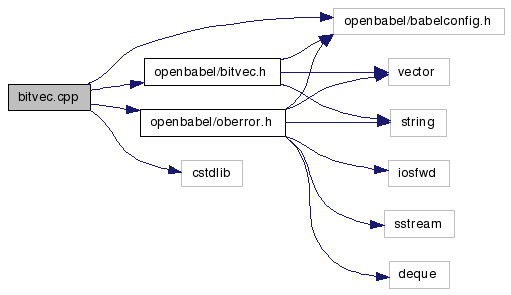
#include <openbabel/babelconfig.h>
#include <openbabel/bitvec.h>
#include <openbabel/oberror.h>
#include <cstdlib>
Include dependency graph for bitvec.cpp:

Namespaces | |
| namespace | OpenBabel |
Defines | |
| #define | LowBit(set, bit) |
Functions | |
| OBBitVec | operator| (OBBitVec &bv1, OBBitVec &bv2) |
| OBBitVec | operator & (OBBitVec &bv1, OBBitVec &bv2) |
| OBBitVec | operator^ (OBBitVec &bv1, OBBitVec &bv2) |
| bool | operator== (const OBBitVec &bv1, const OBBitVec &bv2) |
| OBBitVec | operator- (OBBitVec &bv1, OBBitVec &bv2) |
| bool | operator< (const OBBitVec &bv1, const OBBitVec &bv2) |
| istream & | operator>> (istream &is, OBBitVec &bv) |
| ostream & | operator<< (ostream &os, const OBBitVec &bv) |
| double | Tanimoto (OBBitVec &, OBBitVec &) |
Variables | |
| OBERROR OBMessageHandler | obErrorLog |
| static int | bitsoff [SETWORD] |
| #define LowBit | ( | set, | |||
| bit | ) |
Value:
{register int m; \
if (set != 0) \
{ \
bit = 31; \
if (set != 0x80000000) { \
if ((m = (set & 0x0000ffff))) {set = m; bit -= 16;} \
if ((m = (set & 0x00ff00ff))) {set = m; bit -= 8;} \
if ((m = (set & 0x0f0f0f0f))) {set = m; bit -= 4;} \
if ((m = (set & 0x33333333))) {set = m; bit -= 2;} \
if ((m = (set & 0x55555555))) {set = m; bit -= 1;}}} \
else bit = -1;}